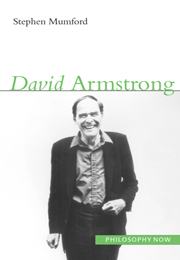5 - Dispositions
Summary
Armstrong's work on universals offers a thorough and detailed account of properties but, as he recognizes, there is a distinctive class of properties that bring with them some very particular problems. These are the dispositional properties, and we shall come to see that they play a crucial role in Armstrong's philosophy of mind. Dispositions are, in any case, often considered as a subject matter in their own right and any naturalistic metaphysics needs to say something about them.
As well as something being square or one metre thick, it may be soluble, volatile or elastic. None of these are likely to be the sparse properties invoked in a final physical theory. But the properties that currently are described in fundamental physical theory, properties such as spin, charge and mass, at least appear to have the same dispositional character as solubility and elasticity. What is this dispositional character that some properties seem to have? This very question is one of the main problems that metaphysicians consider when they look at dispositions. We can offer an initial characterization. What seems most remarkable about dispositions is the way they point towards or make possible other properties or states of affairs. When something is fragile, it bears a special, intimate relation to the property of being broken. It is distinctive of dispositions, however, that this further property or state of affairs need not occur. A fragile object might be handled carefully throughout its existence and might never break.
- Type
- Chapter
- Information
- David Armstrong , pp. 79 - 94Publisher: Acumen PublishingPrint publication year: 2007



